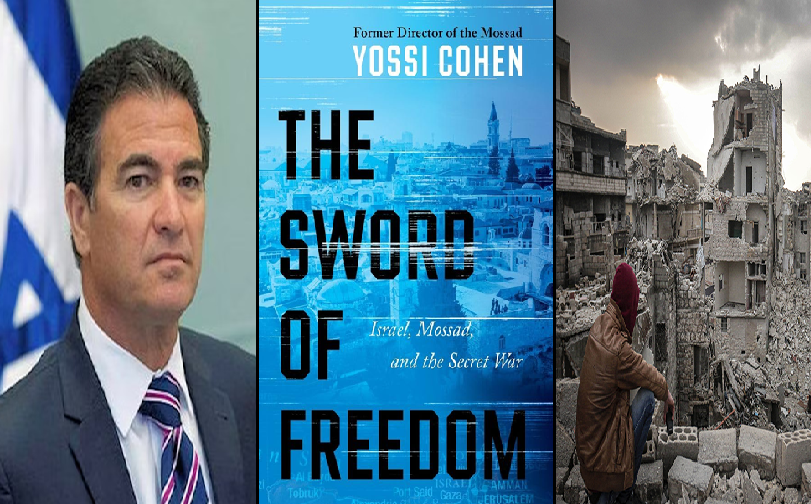
- Yossi Cohen, former Mossad chief, in his memoir The Sword of Freedom, claims a secret collaboration between the Israeli and Russian intelligence during the Syrian Civil War.
- Cohen claims that Putin effectively permitted Israel to carry out targeted operations against Iranian and Assad-linked positions in Syria.
- Syria provided Moscow access to the Tartus naval base and the Khmeimim airbase, both of which became vital military footholds.
- Iran used Syrian territory as a corridor for providing weapons and logistical support to Hezbollah in Lebanon and to Iran-aligned militias in Iraq and Syria.
- Moscow carefully balances its regional diplomacy, mindful that Israel is a U.S. ally yet influential among Russia’s Jewish community with strong cultural and emotional ties to Israel.
Yossi Cohen, former Mossad chief who served from 2016 to 2021, witnessed several major developments during his tenure, from the Abraham Accords to the Syrian Civil War. Cohen’s time period as Mossad chief was one of the most interesting and significant periods for any intelligence head. He later chronicled these experiences in his memoir, The Sword of Freedom. In this book, he reflects on his life, his years as Mossad chief, the contemporary geopolitical shifts, and the secret operations that he and his team undertook.
Among the many insightful accounts in the memoir, one of the most striking revelations is Israel’s covert cooperation with Russia. While this may initially seem surprising given the geopolitical alignments, Cohen explains that Israel has often worked with unexpected partners, including Russia. He describes a secret collaboration between the Israeli and Russian intelligence during the Syrian Civil War.
During the Syrian Civil War, the conflict was primarily between Syrian President Bashar al-Assad and his Arab army, supported by Iran, Hezbollah, and other Shiite forces, and Sunni militant groups, including the Islamic State (ISIS). Russia entered the war in 2015, turning Syria into a battleground for multiple global and regional powers. The United States also intervened, fighting on two fronts: claiming to target ISIS while simultaneously seeking to remove President Assad, as Washington did not want Assad’s regime in power.
Israel also had significant strategic interests in Syria. Iran’s involvement in the conflict enabled it to use Syrian territory as a corridor for providing weapons and logistical support to Hezbollah in Lebanon and to Iran-aligned militias in Iraq and Syria. These weapons were ultimately intended to create deterrence and instability against Israel. Acknowledging this threat, Israel sought to engage with Russia, which played a dominant role in the Syrian theatre. Yossi Cohen was tasked with building and managing this delicate relationship with Moscow.
Cohen reportedly met President Vladimir Putin to discuss Iran’s expanding proxy network in the region. According to the former Mossad chief’s account, Putin acknowledged Israel’s security concerns and agreed to establish a direct line of communication between Russia and Israel. Cohen claims that Putin effectively permitted Israel to carry out targeted operations against Iranian and Assad-linked positions in Syria. This understanding was crucial because Russia had deployed its S-300 and S-400 air defence systems in Syrian territory, and Israel needed to ensure the safety of its American-made F-35 jets operating in the region.
This revelation indicates that despite Russia’s alliances with Iran and the Assad regime, it also maintained a discreet strategic understanding with Israel.
The natural question arises: why would Russia agree to such an arrangement? One reason lies in the strategic significance of Syria. When Russia intervened in 2015, it sought to establish a permanent military presence in the country to expand its influence across the Middle East and North Africa. Syria provided Moscow access to the Tartus naval base and the Khmeimim airbase, both of which became vital military footholds. These bases enabled Russia to project power not only throughout the Levant but also across North Africa, particularly in Libya and the Sahel region.
At that time, Russia’s relationship with Iran was not yet strategic in nature—the deeper alignment between the two emerged much later, around 2024. In 2015, Moscow’s approach was largely pragmatic, and maintaining balance in its relations with Israel allowed it to secure key regional advantages.
By December 2024, when Syria fell under the control of Abu Mohammad al-Julani, the former al-Qaeda commander and leader of Hay’at Tahrir al-Sham (HTS), a group backed by Turkey, Israel emerged as one of the biggest beneficiaries. With Assad removed from power, Iran’s influence in Syria weakened significantly, which in turn diminished Hezbollah’s capabilities and reduced the operational reach of Iranian proxies in the region, limiting their ability to threaten Israel.
However, Russia’s strategic advantages also eroded. HTS seized control of key Russian military installations in Tartus and Khmeimim, and demanded Russia’s withdrawal. Although Russia has not completely withdrawn, it has significantly scaled back its presence. Recently, a meeting was held between Al-Julani, now serving as Syria’s de facto leader, and Russian officials to negotiate the future of Russia’s military presence. Russia wants to retain its foothold, while HTS has reportedly demanded the handover of Bashar al-Assad, who is no longer residing in Syria.
Despite these complexities, Russia has generally maintained a balanced approach toward Israel. Even when many European nations criticised Israel, Russia refrained from adopting an overtly anti-Israel stance. During the Gaza conflict, Prime Minister Benjamin Netanyahu and President Putin remained in contact through phone conversations. Moscow continues to pursue a delicate balance in its relations with regional diplomacy, recognising that while Israel is a key ally of the United States, it also holds influence among Jewish communities within Russia, who maintain deep cultural and emotional ties to Israel.
Cohen’s book highlights the unpredictable nature of geopolitics. In the pursuit of national interest, temporary and surprising partnerships often emerge. The essence of geopolitics is that nations have neither permanent friends nor permanent enemies, only evolving interests that shift with time and circumstance.
Aayush Pal is a freelance writer on contemporary geopolitical developments. The views expressed in his work are entirely his own.
